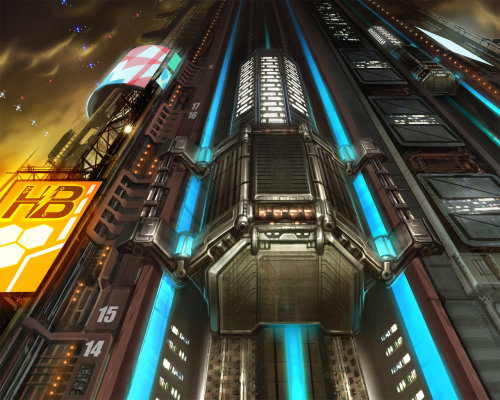One of the core parts of the Android Universe setting is the New Angeles Space Elevator, commonly kn
One of the core parts of the Android Universe setting is the New Angeles Space Elevator, commonly known as the Beanstalk* - so central to it that the RPG expansion for playing games of Genesys in the Android Universe is even called “Shadow of the Beanstalk”. The Beanstalk is not an especially unique element, for sci-fi, but it’s a bit rarer to see it in cyberpunk specifically, and it’s very rare that it gets much attention. But the Beanstalk is a big part of the lore of the Android Universe! - in-setting, it’s the raison d'être for the biggest city in the solar system, and the key to space - almost all of the earth-space commerce is down this link, and the biggest component of that is ALL of earth’s Helium-3, aka fusion fuel. It’s also why (and I love that the Android Universe creators did their research here) the city is where it is - a space elevator needs to be as close to the equator as possible. And thus we get our cyberpunk megacity not in the north American sprawl, or east Asia (though both exist), but in Ecuador - it doesn’t always show, but it’s an interesting difference. Also, it leads to some very cool cards, and some cool card art - what I’m all about. Nisei have really made some beautiful cards in particular, the flip side of Earth Station is amazing. *Slightly incongruous name came from when it was being built - critics and crew working on it both called Jack Weyland’s project “Jack’s Beanstalk”, implying it was a flight of fancy - and also because it’s really tall and goes up into the clouds. The name stuck, and the wealth it produces lines up with the idea of there being gold at the top of the ‘stalk.Beanstalk Royalties by Johnathan Lee, The Root by Alex Kim, Shadow of the Beanstalk cover by Viko Menezes, Cayambe Grid/Earth Station and Earth Station by Kira L. Nguyen, and New Angeles board game cover by Kirsten Zirngibl -- source link
Tumblr Blog : anr-art-blog.tumblr.com
#netrunner#android netrunner#project nisei#cyberpunk#space elevator


